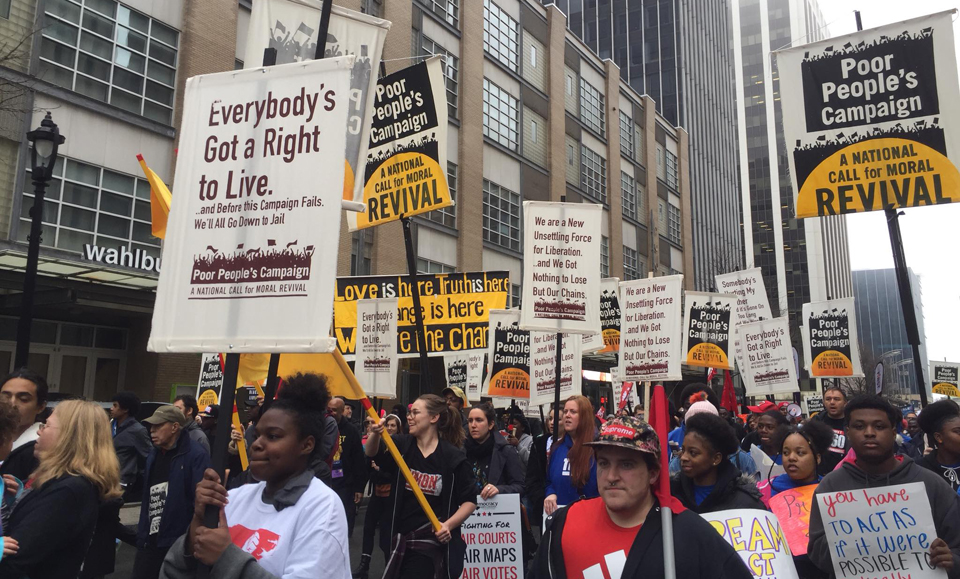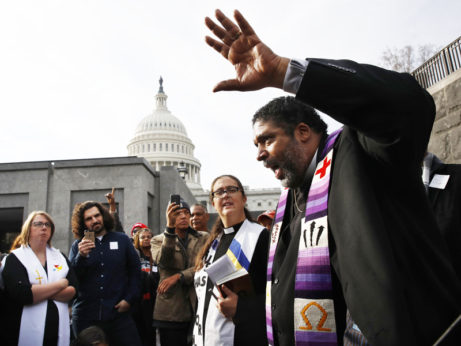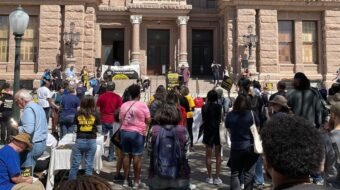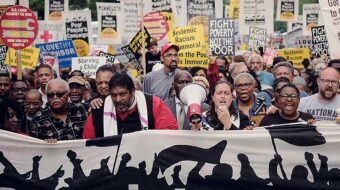
WASHINGTON – Demanding politicians take immediate steps to confront systemic racism, hundreds of poor people, clergy and advocates were arrested Monday from coast to coast as the Poor People’s Campaign: A National Call for Moral Revival intensified during its second straight week of nonviolent direct action.
The Rev. Jesse Jackson, a key leader in the 1968 Poor People’s Campaign, was arrested alongside campaign co-chairs the Revs. William Barber and Liz Theoharis, poor people and clergy who packed the U.S. Capitol rotunda and sat in prayer resisting orders from the Capitol police to disperse. Rev. Jackson and others with the Poor People’s Campaign staged the pray-in after Capitol Police refused to allow them to deliver a letter to U.S. Senate Republican Leader Mitch McConnell and U.S. House Speaker Paul Ryan demanding the immediate restoration of the Voting Rights Act, an end to racist gerrymandering, and the reversal of the preemption of minimum wage increases.
Protests escalated during the second of what will be six weeks of action as activists flooded the lobbies of state capitals, carrying signs reading, “Voter Suppression = The True Hacking of Our Democracy” and “Power to the Polls,” stressing the link between systemic racism, poverty and voter suppression. From Lansing, Michigan to Montgomery, Alabama and Nashville, Tennessee protestors were arrested.
“America’s democracy was under attack long before the 2016 election by racist voter suppression and gerrymandering, which are tools of white supremacy designed to perpetuate systemic racism,” said the Rev. Barber. “These laws target people of color but hurt Americans of all races by allowing politicians to get elected who block living wages, deny union rights, roll back Medicaid, attack immigrants, and underfund public education. Lifting up the 140 million Americans trapped in poverty today begins with ending this domestic assault on our democracy.”
Fewer voting rights than 50 years ago
From Alabama to Alaska, protesters called for the immediate restoration of the Voting Rights Act, an end to racist gerrymandering and reversal of state laws that prevent municipalities from raising wages. A week after President Trump called undocumented immigrants “animals” who “aren’t people,” participants in Monday’s protest also demanded a clear and just immigration system that strengthens our democracy through the broad participation of everyone in this country—including a timely citizenship process that guarantees the right to vote. They also called for respect for the sovereignty of indigenous communities.
“There are fewer voting rights today than there were 50 years ago when the Civil Rights Act and Voting Rights Act were passed,” said the Rev. Theoharis. “That didn’t happen by accident – it’s the result of a widespread war on the poor and disenfranchised in this country. That’s why we are building a multiracial, multicultural fusion movement to respond to this attack by demanding a democracy that works for all.”
Since 2010, 23 states have passed voter suppression laws, including racialized gerrymandering and redistricting laws, as well as measures to reduce early voting days, purge voter rolls and impose stricter voter ID requirements. These attacks follow a broader pattern of curtailing democratic processes by drawing on legacies of racism to undermine local leadership organizing for better conditions. For example, as of July 2017, 25 states have passed laws that preempt cities from passing their own local minimum wage laws, many of which were implemented in response to efforts by predominantly Black cities seeking to raise the minimum wage.
“Voter suppression like I experienced in 2016 keeps Black people from electing leaders who support policies that will lift up our communities,” said Grace Bell Hardison, a 102-year-old Poor People’s Campaign supporter from Belhaven, North Carolina who officials tried to purge from the rolls two years ago. “What’s ironic is the same politicians elected as a result of racist voter suppression end up passing laws that hurt poor white people as well.”
McDonalds workers removed from Illinois capitol
More than 100 McDonald’s cooks and cashiers were physically removed by Capitol police from a protest at the Illinois statehouse Monday – days ahead of the company’s annual shareholder meeting – as the Fight for $15 joined forces with the Poor People’s Campaign: A National Call for Moral Revival in nonviolent direct action to highlight the burger giant’s role in locking workers of color in poverty.
“McDonald’s does everything it can to block people of color like me from getting higher wages,” said Ashley Bruce, a McDonald’s worker from Chicago who is paid $11 an hour and participated in Monday’s action. “I help McDonald’s make billions every year, but I’m paid so little I need government assistance to feed my children. I’m going to continue doing whatever it takes until McDonald’s listens to our demand for $15 an hour and union rights.”
Earlier Monday, a delegation of McDonald’s workers from across the country converged in Chicago and delivered a letter to the company’s new downtown headquarters serving notice of their plans to join the Poor People’s Campaign nonviolent direct action at the state capital Monday afternoon. The letter detailed how McDonald’s perpetuates systemic racism in the U.S. by blocking raises for people of color.

Listening tour shapes movement
Over the past two years, leaders of the Poor People’s Campaign: A National Call for Moral Revival have carried out a listening tour in dozens of states across this nation, meeting with tens of thousands of people from El Paso, Texas to Marks, Mississippi to South Charleston, West Virginia. Led by the Revs. Barber and Theoharis, the campaign has gathered testimonies from hundreds of poor people and listened to their demands for a better society.
A Poor People’s Campaign Moral Agenda, announced last month, was drawn from this listening tour, while an audit of America conducted with allied organizations, including the Institute for Policy Studies and the Urban Institute, showed that, in many ways, we are worse off than we were in 1968.
Earlier this year, poor people, clergy and advocates traveled to statehouses all over the country and the U.S. Capitol to serve notice on lawmakers of the demand that they address the enmeshed evils of systemic racism, poverty, the war economy, ecological devastation and America’s distorted national morality. Lawmakers’ failure to act has spurred this spring’s six weeks of nonviolent moral fusion direct action.
The Campaign draws on the unfinished work of the 1968 Poor People’s Campaign, reigniting the effort led by civil rights organizations, labor union and tenant unions, farm workers, Native American elders and grassroots organizers to foster a moral revolution of values. Despite real political wins in 1968 and beyond, the original Poor People’s Campaign was tragically cut short, both by Dr. King’s assassination and by the subversion of the coalition that sustained it. Still, the original vision and many of its followers did not go away.
The Poor People’s Campaign: A National Call for Moral is building a broad and deep national moral movement – rooted in the leadership of poor people and reflecting the great moral teachings – to unite our country from the bottom up. Coalitions have formed in 39 states and Washington, D.C. to challenge extremism locally and at the federal level and to demand a moral agenda for the common good.
The Poor People’s Campaign: A National Call for Moral Revival is co-organized by Repairers of the Breach, a social justice organization founded by the Rev. Barber; the Kairos Center for Religions, Rights and Social Justice at Union Theological Seminary; and hundreds of local and national grassroots groups across the country.












Comments